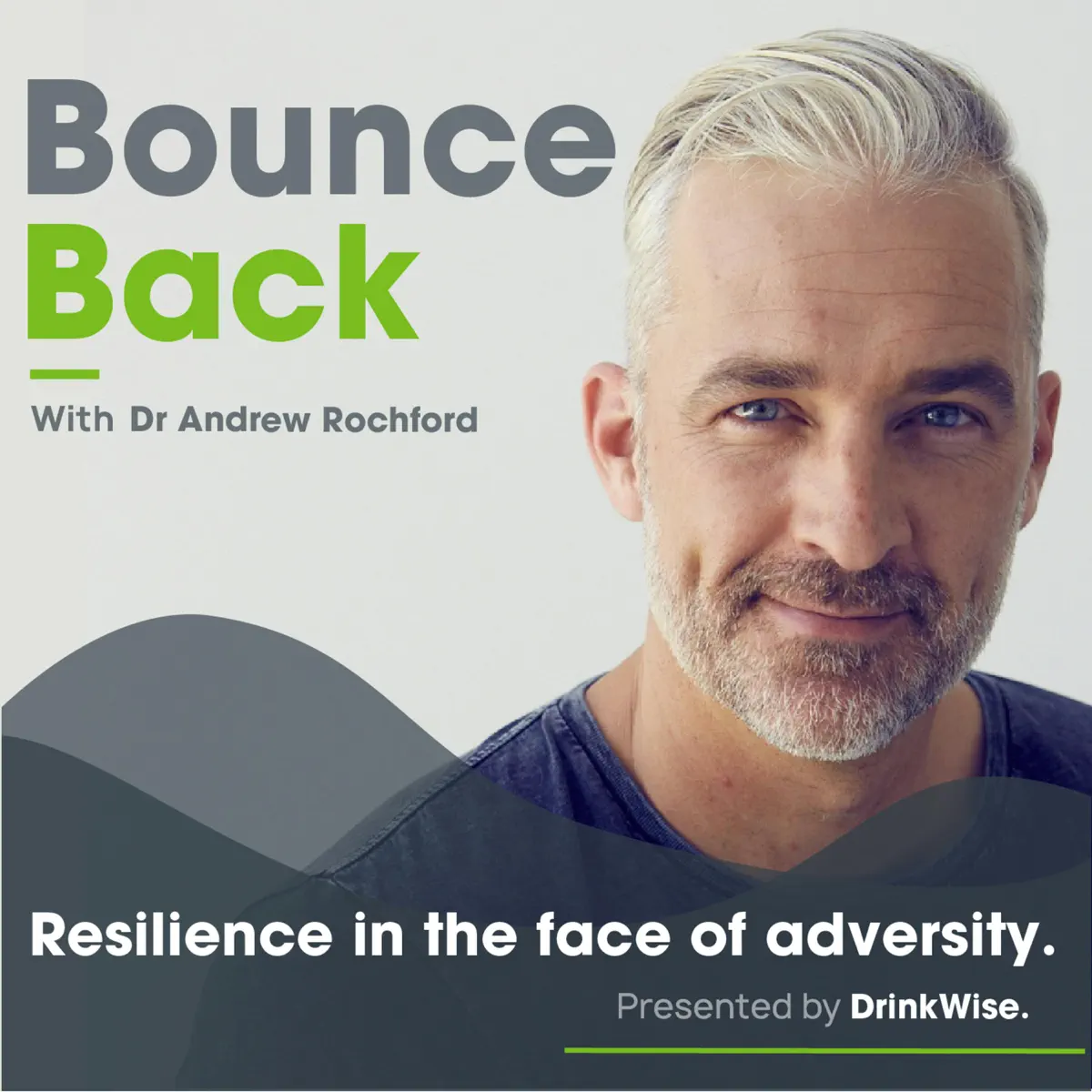It’s normal to feel lost along your path in life, but there are times when we can even lose sight of ourselves and what’s truly important. It’s in those moments where a self-check-in is crucial. Have you been putting yourself first, considering your physical and innate needs? Are too many expectations spoiling your journey or affecting your self-worth?
In this entry of our series, we’ll explore how distractions and extrinsic motivations affect your self-worth and subsequently, how you move forward in life.
This week’s recommendation is a podcast, Bounce Back with Dr. Andrew Rochford. The recommendation comes from Soreya Ahmet, Senior Manager at GML Fleet Management. Hosted by Dr. Andrew Rochford, Bounce Back explores the reality of overcoming one’s life challenges in an honest setting. In his series, Dr. Rochford interviews Australia’s athletes, businesspeople, and politicians for their stories and perspectives.
Soreya recommended a specific episode from the podcast, Ep. 13 featuring Ben Crowe. She first encountered Crowe, a personal mindset coach for athletes and other prominent figures, at a company-sponsored personal session.
“This session through work made me rethink a lot of things as he helps individuals work with their mindset in performance sense and your perspective in a personal sense, and to find balance between confidence and happiness, as well as achievement and fulfilment,” Soreya explained.
“He highlights that being vulnerable is a good thing, where a lot of in a professional forum think this is a sign of weakness. This is not true it shows we are human, and it is received very well. These podcasts and his mentoring/coaching sessions that l attended changed my outlook altogether,” she added.
From this hour-long episode, we’ve highlighted some of the most important sections and pieces of advice. We encourage our readers to listen to the full episode as Ben and Dr. Andrew’s chat is not only insightful, but informative too. If you have an Apple Podcast account, take a listen here! Otherwise, you can click the play button below and read along!
Distractions
The episodes started with Ben’s advice on separating one’s persona from their personalities. As a personal mindset coach for public figures, he noted that there is a difference between the two. A persona is something that you present outwardly, whether it be on social media or even at your job; while your personality is you!
Ben underscored how this separation is essential for athletes and his prominent clients, who have no choice but to face public opinion. If they were to take criticisms or public opinion seriously as part of who they really are rather than just part of their personas, they’d be in “a world of pain.”
Though it sounds daunting, this advice applies for us regular folk too. These opinions can come from our family members, friends, co-workers, etc. Whether they’re negative or positive, taking others’ opinions or judgments as part of who you are can distract you from what matters most or even your sense of self.
“Get back to what is real—your relationships with your family or yourself,” Ben advised.
Aside from others’ opinions, there are a few other distractions that could deter you from your sense of self—namely; focusing on results and getting caught up in your own expectations or ego.
Ben mentioned that, due to social media, it’s been easier for people to become preoccupied with expectations when they might not even be real. Though the episode was recorded back in 2020, the notion is even more applicable 5 years later with the rise of AI. Filters, deceptive ads, and an invisible pressure to perform the perfect life online add to a growing list of unrealistic expectations.
The truth of the matter is that everyone is equal, regardless of where they come from or what their occupation is. According to Ben, believing this opens you up to the mindset that you are enough, and believing that you are enough cultivates self-love and self-acceptance. Cultivating strong sense of self-love and acceptance are great intrinsic foundations and powerful armour against distractions.
“The most important love is self-love. The most important acceptance is self-acceptance.” – Ben Crowe
Your Relationship with Yourself
To Ben, it’s when have these healthy relationships with ourselves that we can own our identity and share ourselves with the world. “We have to own ourselves and our stories then we can share with others and not have to put ourselves below or above others,” he explained. It’s like the analogy of the cup—how can you pour from your cup to give to others if it’s empty?
Developing a healthy relationship with yourself is crucial but the idea sounds vague. So, how do you start?
Ben says there are two fundamental questions to ask yourself: “Who am I?” and “What do I want?” Though worded simply, these questions are not easy for everyone to answer.
First, you have to ask yourself who you are to develop your confidence. Confidence does not occur when you believe that you are perfect but when you celebrate your imperfections. Doing this allows you to separate your self-worth from your experiences—again, not taking anything personally.
According to Ben, people tend to be negative towards themselves. Experiences, mistakes, and thoughts can easily be misunderstood as who you are at a core rather than just part of life. “Part of the journey is realising that our life story isn’t our life– it’s just our story and we’re the author of it,” he explained. “When you can own your story, you’re bulletproof.”
The second question you need to ask yourself is: “What do I want?” In asking this, you’ll have to reflect on what brings you joy and happiness, and if these things also bring you purpose and meaning. In realising the human need for connection, there is also a truth that “no one in this world can do anything on their own.”
In relation to the distractions mentioned earlier, it is easier to lose control of our perspectives and personal will when we don’t have a solid sense of self. As Ben puts it, “it’s like surrendering to your circumstances. […] If it’s rainy, I’ll be sad. If it’s sunny, I’ll be happy.”
Eventually, once you’ve thoroughly gotten to know yourself (and honestly, the process is never-ending), it becomes clearer that we are not victims of our circumstances, but active participants in our lives.
In a similar vein, people without a solid sense of self coupled with a propensity to fall pressure to expectations feel the need to fulfil a certain role in their lives. If they feel that they eventually fall short of this role, they turn to—what Ben refers to as— “behavioural cover-ups.” Examples of behavioural cover-ups include judging and criticising others and placing blame on other people. Eventually, these cover-ups can even manifest into addictions to alcohol, drugs, shopping, social media, etc. These addictions become a coping mechanism that numbs the disappointed one feels when their ego is bruised by a role they can’t fulfil.
If you find yourself in the whirlwind of these behavioural cover-ups or addictions, it’s time to step back and ask yourself the two crucial questions to assess what’s important to you and what isn’t. Most significantly, as Ben advised, “Give yourself permission to be imperfect.”
The Hero’s Journey
To illustrate, Ben cited the hero’s journey to explain the process of accepting life. The hero’s journey is a story-telling structure commonly used in science fiction and fantasy genres. This structure follows the protagonist as they encounter and complete a quest, usually of great importance.
Ben makes an example of Star Wars, particularly Luke Skywalker’s story as one of the franchise’s main heroes. As he explained, the first part of the hero’s journey is “all about me.” The hero is mostly concerned about themselves and prepares for the journey they’re about to take.
This leads to the second part, where the hero faces “life-altering moments laced with meaning.” Rather than running away, the hero confronts these problems head-on and allows themselves to experience them. Both Ben and Dr. Andrew noted that it is in darkest time that people grow the most. Again, Ben repeated that even if it is a hero’s journey, they could not do it alone and that it is up to us to find people to create safety for ourselves.
In the last and third part, the hero appreciates life. There is a transition away from the self and towards others. This transformation unlocks a sense of purpose and meaning. “Life is not about you. Life is about the impact you have on someone else’s life,” Ben explained.
In the podcast, Ben details his experience working with tennis player, Ash Barty. We recommend listening to this part in full, as Ben recalls a practical application of his previous advice.
The Perfection Myth
“The Perfection Myth” is exactly how it sounds—the idea of perfection is simply unrealistic. Ben pointed out that the advertising industry has convinced us that we need to buy and consume to be “enough.”
“If you can love yourself unconditionally, you’re not craving what others think about you. You already believe you are enough,” he elaborated.
“Find the perfect non-perfect version of yourself,” Dr. Andrew added.
Ben’s explanation of shame is interesting. He first claims that “connection is why we’re here.” There is an intrinsic need for connection in all humans. Opposing this is the idea of shame, which is a fear of disconnection. Shame, compared to guilt, is more internalised.
Both Ben and Dr. Andrew agree on a current perfection myth “epidemic.” There’s a widespread focus on fame, wealth, and status and projecting a perfect image. But according to the episode, imperfections are what connects humans together.
When someone falls for the myth of perfection, they believe that they are not enough. Since perfection is unattainable, the only antidote is to believe that you are enough despite all the external influences.
Our Review of Episode 13
While this might be only one episode of the podcast, it features a great range of life advice. The discussions between Ben and Dr. Andrew illustrate a disconnect between people and life. There is an overarching theme that captures the importance of self-worth and how it affects our lives overall.
Both host and guest had a healthy discussion with both theoretical and practical implications. Ben Crowe is an appropriate guest for the topic, as his profession allows him to draw insights from his and his clients’ experiences. Listeners may find themselves inspired at the mention of some of these prominent figures, rather than a name they can’t put a face to.
Though majority of the conversation focuses on the self, the speakers also acknowledged a need to connect with others. These days, much life advice on the internet promotes the self without proper context. Ben and Dr. Andrew highlight the need for community and connection with insightful explanations that back up their advice.
We recommend this podcast for those who feel lost or disconnected from themselves. The episode is an easy listen, but the discussion packs a punch where it’s needed. Listeners may resonate easily with any part of the discussion, some more than others—but the topic is universal, nonetheless. Even if you don’t feel lost at the moment, there’s something profound to pick up from the episode.
Sit back, lend your ear, and learn to Bounce Back with Dr. Andrew Rochford.
Was this entry interesting? Check out our book recommendations for more!














